Introduction – Bamboo Tissues
One of the worst practices in our minds at ShrinkThatFootprint is the modern manufacture of tissues, paper towels from virgin forests. Cutting down original forests reduces our carbon sink, and making tissues that are discardable that then degrade into waste gases adds to the carbon in the atmosphere. That’s what gets us quite excited about bamboo tissues.
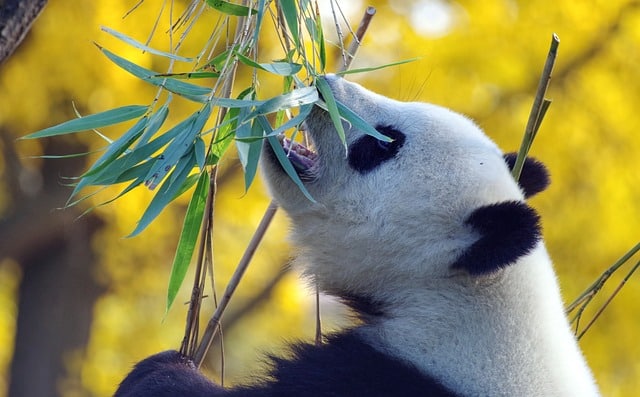
The reason for our excitement is that bamboo is incredibly carbon-friendly because it’s a fast growing, propagates easily, and naturally already grows in large areas. Moreover, after harvesting, it needs no replanting and will recover quickly. Bamboo requires few pesticides, fertilizers, and very little water to grow, making it an ideal plant for areas prone to drought.
One of the issues of bamboo tissues is that manufacturing technology hasn’t let it achieve the same level of softness as wood-derived tissues. The reason is the high lignin content and the resulting stiffness (47.2% cellulose, 23.9% hemicelluloses, 23.8% Klason lignin, 1.5% acid-soluble lignin). However, technology continues to improve and we expect bamboo tissues to catch up with wood-derived tissues in the near future.
Bamboo Tissues Have Many Uses
Bamboo tissues are very strong and can be used in various applications. Bamboo tubes in their original grass form are often used in construction, because the tubes withstand high levels of force. Similarly the tissues are strong and durable. These sustainable tissues are an excellent alternative to traditional paper products.
Bamboo tissues are composed of small, hollow tubes made of a substance called cellulose. The cellulose is arranged in a series of overlapping layers that give the tissue its strength. There are many manufacturers of bamboo tissue in the market. These eco-friendly tissues are made of bamboo pulp and are soft, absorbent, and strong.
Bamboo Tissue Drawbacks
While bamboo-based tissues are often praised for their eco-friendliness and other advantages, there are indeed several potential downsides, particularly when compared to conventional tissues made from wood pulp. Here are 4 areas from our personal experience where bamboo falls short, yet not enough so to deter us from buying and using them.
- Absorbency: While some find bamboo tissues to be highly absorbent, others have noticed a lower absorbency compared to regular tissues. This difference in performance could potentially make bamboo tissues less effective in handling sneezes, spills, and other situations where high absorbency is required.
- Texture: While the quality can vary, certain brands of bamboo tissues might feel rougher or stiffer to the touch compared to their wood pulp counterparts. This could lead to discomfort during use, particularly for individuals with sensitive skin or during an illness where comfort is paramount.
- Price: Bamboo tissues can be more expensive than conventional tissues, largely due to the higher costs associated with processing bamboo fibers. This could be a significant drawback for budget-conscious consumers.
- Availability: Depending on where you live, bamboo tissues might be less readily available than traditional tissues. This could necessitate ordering online or visiting specialized stores, which might not be as convenient.
Our Four Recommendations
1. Cheeky Panda – Bamboo Facial Tissues
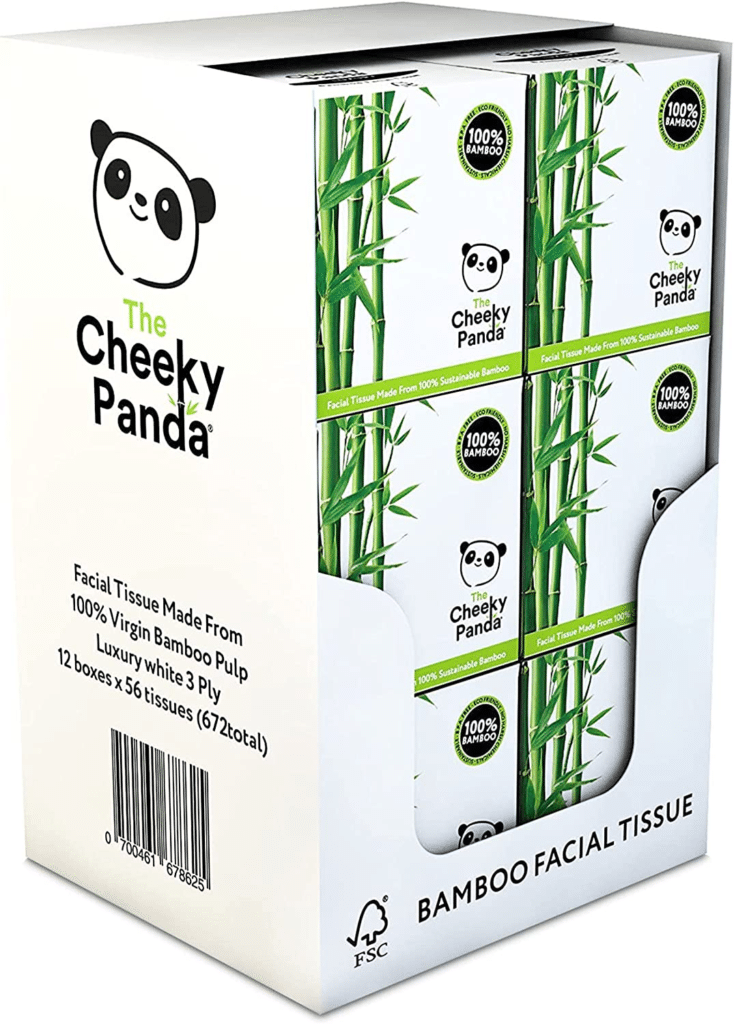
There are a number of features we liked about Cheeky Panda. The tissues have been packaged in recyclable paper which further reduces carbon impact. The paper itself is basically just bamboo treated once with hydrogen peroxide and then with no “chemicals added”.
We don’t know what chemicals could be added but guess that whatever is used in industrial processing of plant cellulose into papers has been substituted with a more natural process. We tried this tissue paper ourselves. It really is very close to normal tissue papers except it has a bit more stiff and scratchy. But it’s subtle enough that we would use Cheeky Panda for basically anything except perhaps on irritated skin.
2. NooTrees Bamboo Tissues
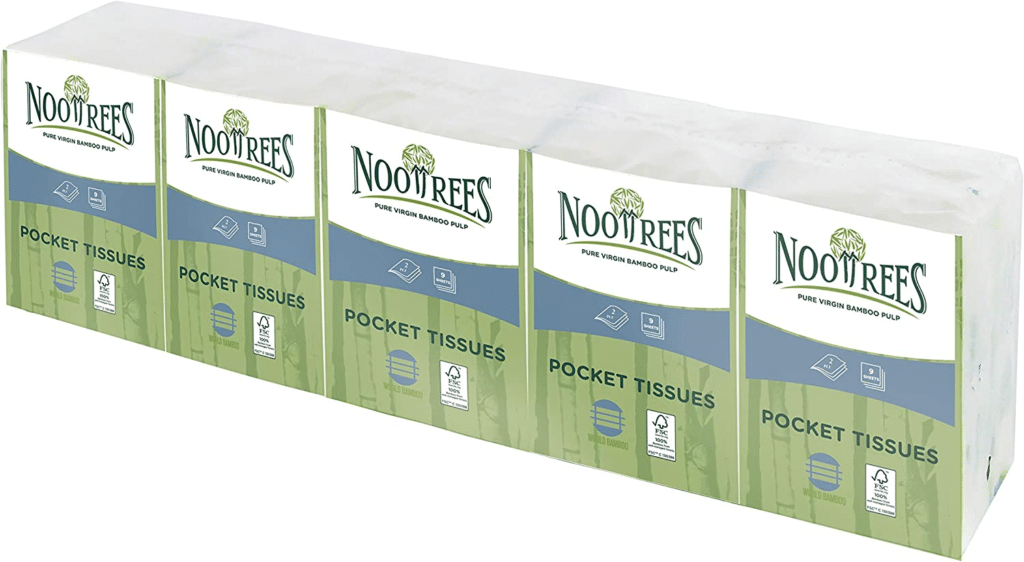
The NooTrees tissues are different from home use tissues in that they are shaped for a shirt or pants pocket by being in a small package slightly taller than they are wide or thick. The product is made of new bamboo pulp.
Remember that because bamboo is a grass that when you harvest it, even if its new, the roots stick around and they will grow back. The Eco-Luxe tissue paper is soft, strong, highly absorbent and BPA free. Like other tissues they are carbon neutral because the bamboo is a carbon sink that sequesters carbon in the air, which after harvest and processing and disposal, returns back into the atmosphere.
3. DrDirt Bamboo Facial Tissue
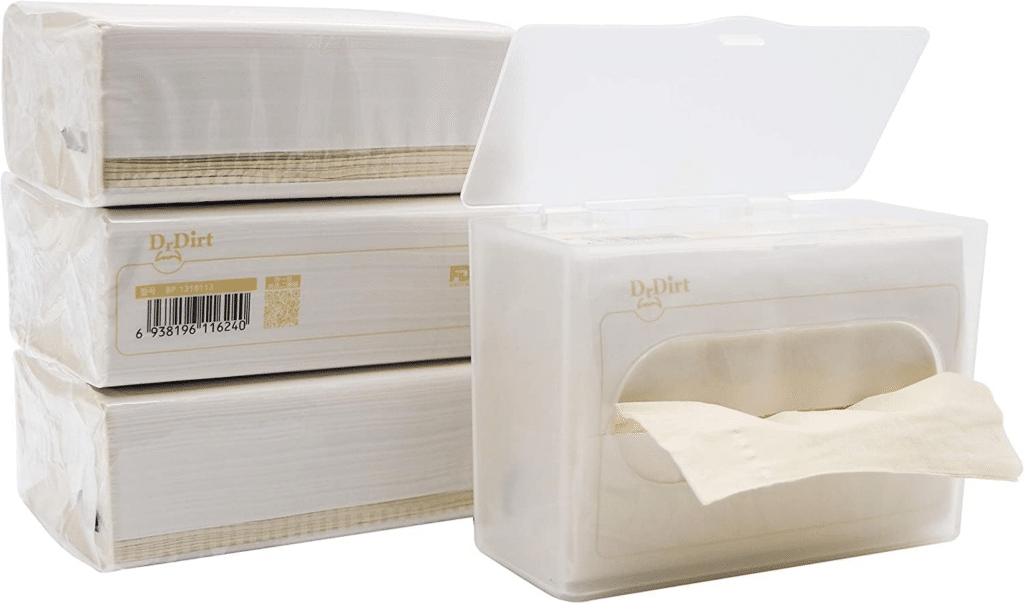
DrDirt Bamboo Facial Tissue sets a new standard for eco-friendly and skin-friendly products with its high-quality bamboo and virgin wood pulp blend. Catering to sensitive skin types, this tissue offers a soft, scentless, and hypoallergenic solution ideal for people dealing with allergies or colds. With its 110-sheet packs, each sheet is impressively durable and absorbent, thanks to its 3-ply construction, ensuring you won’t experience any unwanted paper residue on your face or hands.
Each sheet’s size is well thought out, being neither too large nor too small – a perfect 5×6.8 inches, promising a one-time effective wipe, thus minimizing wastage. The set comes with five packs, a total of 440 sheets, offering a lasting supply for any household. As an added bonus, a wall-mounted tissue box is included in the package, complete with a 3M sticker for easy installation and four non-slip tablets for stable tabletop placement. This bamboo tissue from DrDirt not only upholds quality and functionality, but also displays great respect for both consumer health and the environment.
4. Caboo Tree Free Bamboo Facial Tissue
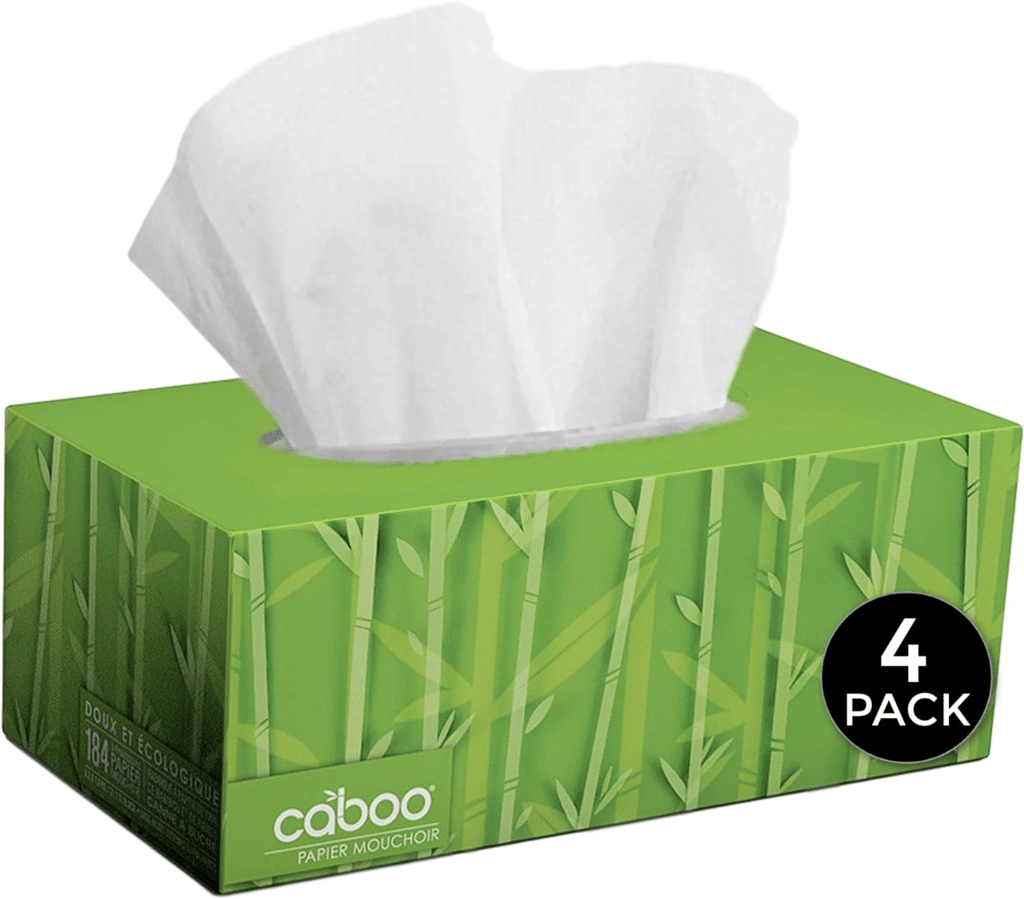
Caboo’s Tree Free Bamboo Facial Tissue Paper presents an eco-friendly, hypoallergenic alternative to conventional tree-based facial tissues. These facial tissues are thoughtfully made from sustainably grown bamboo, which is a quickly renewable resource. Caboo’s commitment to sustainability shines through in their product, offering a green solution that is kind to our planet.
Known for their ultra soft texture, these tissues are safe and remarkably gentle on sensitive skin. They are also lint-free quality, making them an excellent choice for cleaning smudges off eyewear, cell phones, or for quick makeup touch-ups.
The bulk pack contains four rectangular boxes, each holding 120 3-ply sheets, summing up to a total of 480 tissues. Caboo takes its commitment to safety and transparency a step further by making these tissues biodegradable, septic safe, BPA-free, and unscented. They are also paraben-free and non-GMO project verified, ensuring unmatched excellence in their product.
In addition to these credentials, Caboo is accredited by the BRC Global Standards, FSC, ISO 14000, and is proudly panda friendly, confirming its dedication
How Is Bamboo Tissue Made?
Bamboo tissue is created through a process of bamboo pulping. Bamboo fibers are separated and then made into a slurry, or suspension, in water. The bamboo fibers are then combined with chemicals to create a bamboo pulp. Once the bamboo pulp is made, it is bleached and dried to create bamboo tissue.
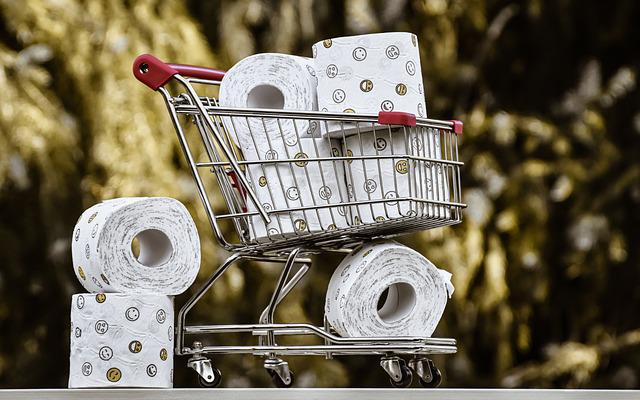
Bamboo tissue is often used in various products, such as paper towels, napkins, and toilet paper. Because bamboo is such a fast-growing plant, it is a sustainable resource that you can use to create eco-friendly products. Bamboo tissue is also very durable and absorbent, making it an ideal material for many different purposes.
Bamboo Tissue Benefits
Bamboo is a naturally renewable raw material that can be regrown and harvested regularly without damaging the environment. Bamboo is also one of the fastest-growing plants in the world, meaning that it can provide a sustainable source of tissue paper. Bamboo is also strong and durable, making it an ideal material for many different purposes. In addition, bamboo is environmentally friendly, as it requires very little water to grow and does not need pesticides or fertilizers. Here are some benefits of bamboo tissue:
Fast-growing
Bamboo is an incredibly fast-growing plant, making it a highly sustainable tissue paper source. One bamboo shoot can grow up to two feet in a single day, and a bamboo plantation can produce 10,000lbs bamboo per acre yearly. That means that bamboo tissue paper is a very efficient way to use this renewable resource.
Bamboo tissue paper is also soft and absorbent, making it perfect for various uses. It’s strong enough for wiping down surfaces yet gentle enough for toilet paper or facial tissue use. Bamboo tissue paper is biodegradable, which won’t clog up landfills like conventional tissue paper products. So if you’re looking for a sustainable and eco-friendly option for tissue paper, bamboo tissue paper is the way to go.
Strong And Durable
Bamboo is an incredibly strong and durable material, making it the perfect choice for tissue. Bamboo tissue is highly absorbent and can hold up to three times its weight in moisture, making it ideal for any application where you need a tissue that can stand up to heavy use.
Bamboo tissue is also hypoallergenic and naturally antibacterial, making it a great choice for people with sensitive skin. Bamboo tissue is also eco-friendly, as it is made from a sustainable resource and is fully biodegradable. If you are looking for strong, absorbent, and gentle tissue on your skin, bamboo tissue is a perfect choice.
Biodegradable And Recyclable
Bamboo tissue is a type of bamboo that is biodegradable and recyclable. You can use bamboo tissue to make paper, cloth, or other products. Bamboo tissue is a sustainable resource because it grows quickly and does not require pesticides or herbicides.
Bamboo tissue is biodegradable, which will break down naturally over time. Bamboo tissue can also be recycled, meaning you can make it into new products after using it. Bamboo tissue is an environmentally friendly option for those looking for an alternative to traditional materials.
Soft And Absorbent
Bamboo tissue is prett soft and absorbent, making it a great choice for various applications. We’re not going to claim that its equivalent to wood-derived tissues (the kind that is most commonly used).
Bamboo tissue is used in the production of baby products, as it is gentle on delicate skin. Bamboo tissue is popular in the beauty industry, as you can use it to make facial masks and exfoliating scrubs.
Hypoallergenic
Bamboo tissue is one of the most hypoallergenic materials available, making it ideal for people with allergies or sensitivities. The fibers are naturally resistant to dust mites, mold, and mildew and are antibacterial.
As a result, bamboo tissue is an excellent choice for people who suffer from allergies or asthma. In addition, bamboo tissue is extremely soft and absorbent. The fibers are also much stronger than cotton fibers, making bamboo tissue an ideal choice for towels, bedding, and clothing.
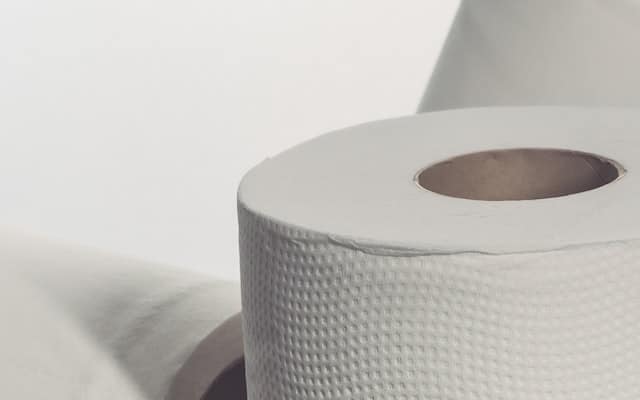
Free Of Chemicals And Bleaches
Bamboo tissue is an environmentally friendly alternative to traditional paper products. Unlike tree-based paper, bamboo tissue is free of chemicals and bleaches. Bamboo is also a highly renewable resource, as it grows quickly and does not require the use of pesticides or fertilizers. As a result, bamboo tissue is a more sustainable option for personal and commercial use.
Bamboo tissue is also incredibly soft and absorbent. It is ideal for facial tissues, paper towels, and toilet paper. Bamboo tissue is also hypoallergenic, making it a good choice for people with sensitive skin. Bamboo tissue is a safe and sustainable alternative to traditional paper products.
Compostable
Bamboo tissue is a great alternative to traditional paper products. It is compostable, which will break down into natural materials used to fertilize the soil. Bamboo tissue is also stronger and more absorbent than traditional paper products. Bamboo tissue comes from bamboo plants, one of the world’s fastest-growing plants.
Bamboo grows quickly without the need for pesticides or herbicides, making it a sustainable resource. Bamboo tissue is biodegradable, meaning it will not contribute to landfill waste. You can use bamboo tissue similarly to traditional paper products, such as tissue paper, napkins, and paper towels. When bamboo tissue is composted, it will quickly break down and return to the earth, providing valuable nutrients for plants and crops.
Wrapping Up
In conclusion, bamboo tissue is a great alternative to traditional paper products. It is made from a sustainable resource, it is compostable, and it is hypoallergenic. Bamboo tissue is also soft and absorbent. Bamboo tissue is a great option if you are looking for an eco-friendly alternative to traditional paper products. Thanks for reading!
